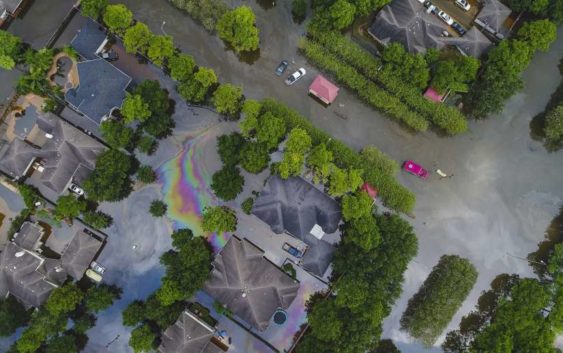- Seven months after Hurricane Helene, Chimney Rock rebuilds with resilience
- Wildfire in New Jersey Pine Barrens expected to grow before it’s contained, officials say
- Storm damage forces recovery efforts in Lancaster, Chester counties
- Evacuation orders lifted as fast-moving New Jersey wildfire burns
- Heartbreak for NC resident as wildfire reduces lifetime home to ashes
City to present findings from Hurricane Harvey health registry

-
Homes in the Canyon Gate area of Cinco Ranch are surrounded by water from Barker Reservoir, Saturday, September 2, 2017, in Houston. (Mark Mulligan / Houston Chronicle)
Homes in the Canyon Gate area of Cinco Ranch are surrounded by water from Barker Reservoir, Saturday, September 2, 2017, in Houston. (Mark Mulligan / Houston Chronicle)
Photo: Mark Mulligan, Staff Photographer / Mark Mulligan / Houston Chronicle
Homes in the Canyon Gate area of Cinco Ranch are surrounded by water from Barker Reservoir, Saturday, September 2, 2017, in Houston. (Mark Mulligan / Houston Chronicle)
Homes in the Canyon Gate area of Cinco Ranch are surrounded by water from Barker Reservoir, Saturday, September 2, 2017, in Houston. (Mark Mulligan / Houston Chronicle)
Photo: Mark Mulligan, Staff Photographer / Mark Mulligan / Houston Chronicle
Houston officials today will release initial findings from a Hurricane Harvey health registry modeled on the one created in the aftermath of the 9/11 attacks on the World Trade Center.
Mayor Sylvester Turner will present highlights from the report, which thusfar has collected information from more than 13,000 people about the 2017 hurricane’s effects on their physical and mental health and housing before, during and after the storm.
The registry was launched in April 2018, and still is seeking participants. It is the first research collecting and maintaining health information about environmental exposures following a major U.S. flooding event.
RELATED: Harvey registry will track storm’s health toll
Harvey was one of the costliest and deadliest storms on record, inflicting $125 billion in damages and killing at least 103 people in Texas. It also exposed people to increased air pollution, water pollution, soil contamination, mold and other health risks.
The registry focuses on people in Houston during and after the storm.
todd.ackerman@chron.com
twitter.com/chronmed